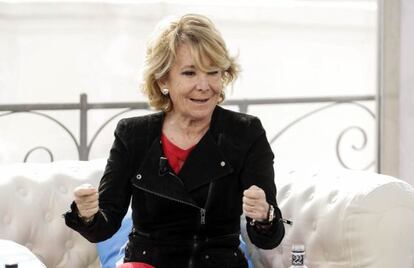Homeless people damage tourism, says Madrid mayoral hopeful Aguirre
Popular Party candidate says sight of people sleeping rough hurts image of capital Authorities should be able to take people to shelters by force, she argues

The Popular Party’s candidate for Madrid mayor, Esperanza Aguirre, has promised to carry out an “in-depth” study of why people “are permitted to live on the streets” of the Spanish capital, arguing that homeless people damage tourism in the city.
Aguirre, who is also the head of the Popular Party (PP) in the Madrid region, said on Monday that she wanted to know why things no longer happen “as they did before” when, she said, paramedics “arrived, offered those who want to sleep in the street the chance to go to a shelter and if these people didn’t want to go, the paramedics took them away. To do exactly what to them, I don’t know exactly, a health evaluation or whatever, I guess, and after that the whole area was cleaned.”
Before if these people didn’t want to go, the paramedics took them away – to do exactly what, I don’t know”
Aguirre’s words echo a 2006 proposal made by former Madrid mayor Alberto Ruiz-Gallardón that called for the introduction of a “legal tool” that would allow municipal police to take homeless people to shelters – against their will if necessary.
The difference is that Aguirre, a former Madrid regional premier, repeated the idea on Monday not in the context of social services, but at a tourism event, placing the emphasis on the damage to the capital’s image caused by the presence of homeless people sleeping rough. She connected the issue to the cleanliness of the streets and the problem of graffiti.
Aguirre also said that the number of public demonstrations in the capital provided a similar threat to tourism. In her opinion the “1,800 protests” that take place each year in the city center – the actual figure recorded in 2013 was 391 – “chase away,” “intimidate” and “restrict” tourists, adding that she would like to see plans to limit citizens’ constitutional right to protest in the capital.
Opposition politicians reacted angrily to Aguirre’s remarks. The Socialist Party’s number two candidate in May’s mayoral elections, Purificación Causapié, issued a statement saying the problem of homeless people is not “stemmed using bans but by applying truly effective measures to combat poverty and social exclusion so they can rebuild their lives.”
A December 2012 survey by City Hall located 1,900 homeless people in Madrid, of whom 701 slept rough, with the rest spending the night in municipal shelters and charity-run centers. The figures for those sleeping in the open air were similar to those of previous years: 621 in December 2006; 650 in February 2008; 651 in June 2008; in March 2009; and 596 in February 2010.







































